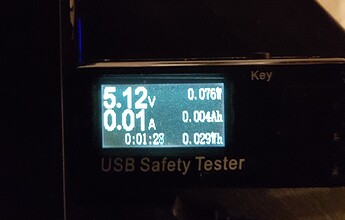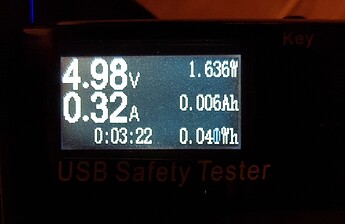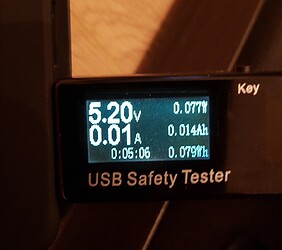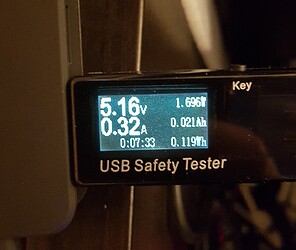Hello,
I have just purchased a Vero4K and am quite happy with it – wonderful little device! – apart from the pain of the 100Mbps Ethernet (which I was aware of). No problem though, this thread provided hope with the use of an USB adapter!
I therefore also got one of the recommended, known working adapters from this page – the CSL Realtek-based one mentioned above; even came from Amazon in the little blue box, assorted with the OSMC 
Alas, it does not work at all; the experience was anything but plug-and-play. I tried plugging it in before and after booting the Vero4k, with and without a cable, while in the console as well as in Kodi. Nothing works to get it running. Looking at the logs, it seems that there is a problem with the USB3 (xhci-hcd) support on the OSMC, the driver keeps dying and restarts permanently (see below for logs example). Basically, it’s stuck in a loop of detect → configure → crash → die → detect → …
I also tried another USB3/Gigabit adapter I had around the house, a Surecom one based on the ASIX 88xxxx, and with that one it’s not even detected by the kernel – nothing appears in the logs, nothing in lsusb, it’s as if it doesn’t exist.
Needless to say, both adapters work just fine and fast when connected to other machines.
So, here I am asking for your kind help. Is there any magical incantation that one has to do to get USB3 working on this device? I tried plugging in a keyboard and mouse combo (using USB2/slow speed) and they both worked fine; seems that USB3 is the problem. Since there is no USB3 support anyway, can we disable the driver? I tried rmmod-ing it but unfortunately it’s built-in :-/
[====================== dmesg ==========================]
[ 74.013471] usb 1-1: new full-speed USB device number 2 using xhci-hcd
[ 84.023091] xhci-hcd xhci-hcd.0.auto: xHCI host not responding to stop endpoint command.
[ 84.023139] xhci-hcd xhci-hcd.0.auto: Assuming host is dying, halting host.
[ 84.047263] xhci-hcd xhci-hcd.0.auto: Host not halted after 16000 microseconds.
[ 84.047297] xhci-hcd xhci-hcd.0.auto: Non-responsive xHCI host is not halting.
[ 84.047323] xhci-hcd xhci-hcd.0.auto: Completing active URBs anyway.
[ 84.047407] xhci-hcd xhci-hcd.0.auto: HC died; cleaning up
[ 89.042875] xhci-hcd xhci-hcd.0.auto: Timeout while waiting for a slot
[ 89.042890] xhci-hcd xhci-hcd.0.auto: Abort the command ring, but the xHCI is dead.
[ 89.062895] amlogic_xhci_work lock
[ 89.062954] xhci-hcd xhci-hcd.0.auto: remove, state 1
[ 89.062972] usb usb2: USB disconnect, device number 1
[ 89.064617] xhci-hcd xhci-hcd.0.auto: USB bus 2 deregistered
[ 89.064633] xhci-hcd xhci-hcd.0.auto: remove, state 1
[ 89.064646] usb usb1: USB disconnect, device number 1
[ 94.042796] xhci-hcd xhci-hcd.0.auto: Timeout while waiting for a slot
[ 94.042825] xhci-hcd xhci-hcd.0.auto: Abort the command ring, but the xHCI is dead.
[ 99.042620] xhci-hcd xhci-hcd.0.auto: Timeout while waiting for a slot
[ 99.042635] xhci-hcd xhci-hcd.0.auto: Abort the command ring, but the xHCI is dead.
[ 99.044121] xhci-hcd xhci-hcd.0.auto: USB bus 1 deregistered
[ 99.152683] xhci-hcd xhci-hcd.0.auto: xHCI Host Controller
[ 99.152720] xhci-hcd xhci-hcd.0.auto: new USB bus registered, assigned bus number 1
[ 99.153541] xhci-hcd xhci-hcd.0.auto: irq 62, io mem 0xc9000000
[ 99.153680] usb usb1: New USB device found, idVendor=1d6b, idProduct=0002
[ 99.153687] usb usb1: New USB device strings: Mfr=3, Product=2, SerialNumber=1
[ 99.153692] usb usb1: Product: xHCI Host Controller
[ 99.153697] usb usb1: Manufacturer: Linux 3.14.29-55-osmc xhci-hcd
[ 99.153702] usb usb1: SerialNumber: xhci-hcd.0.auto
[ 99.155095] hub 1-0:1.0: USB hub found
[ 99.155538] hub 1-0:1.0: 2 ports detected
[ 99.155755] xhci-hcd xhci-hcd.0.auto: xHCI Host Controller
[ 99.155772] xhci-hcd xhci-hcd.0.auto: new USB bus registered, assigned bus number 2
[ 99.155897] usb usb2: New USB device found, idVendor=1d6b, idProduct=0003
[ 99.155904] usb usb2: New USB device strings: Mfr=3, Product=2, SerialNumber=1
[ 99.155909] usb usb2: Product: xHCI Host Controller
[ 99.155914] usb usb2: Manufacturer: Linux 3.14.29-55-osmc xhci-hcd
[ 99.155919] usb usb2: SerialNumber: xhci-hcd.0.auto
[ 99.157351] hub 2-0:1.0: USB hub found
[ 99.157402] hub 2-0:1.0: config failed, hub doesn’t have any ports! (err -19)
[ 99.157548] amlogic_xhci_work unlock
[ 99.472681] usb 1-1: new full-speed USB device number 2 using xhci-hcd
[ 109.482742] xhci-hcd xhci-hcd.0.auto: xHCI host not responding to stop endpoint command.
(… rinse and repeat …)
[====================== dmesg ==========================]
Thank you in advance for any information,
Regards,
Mihnea




